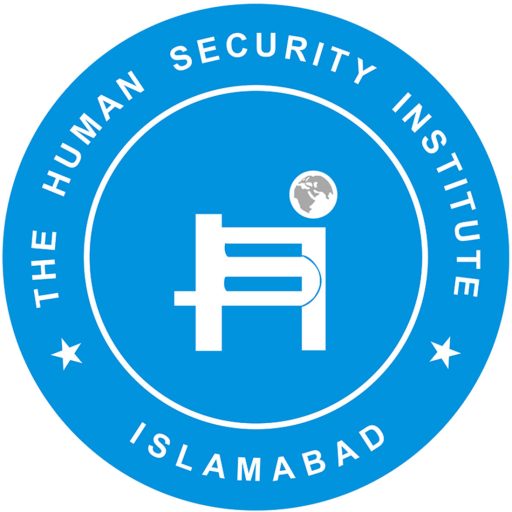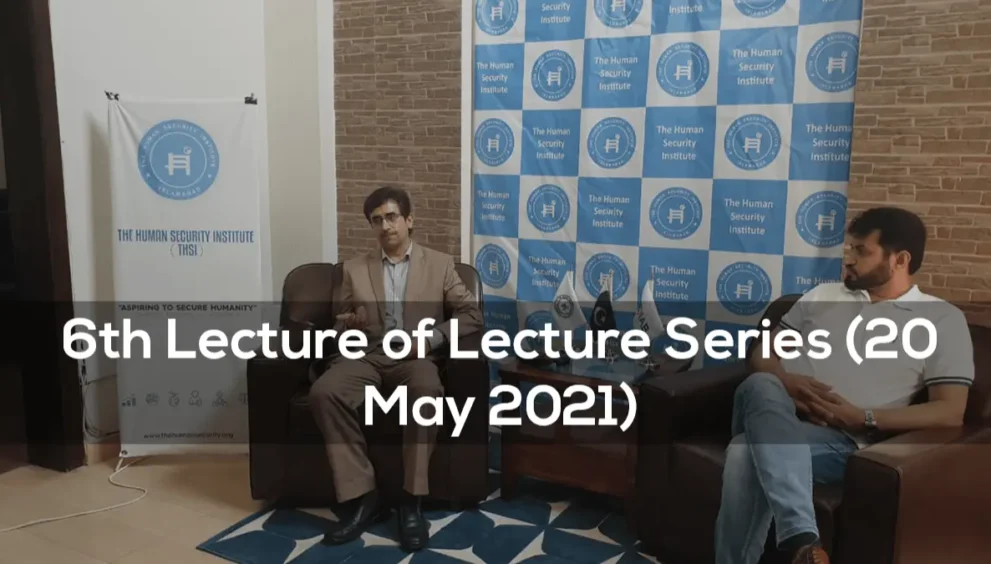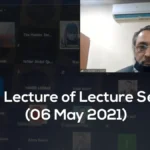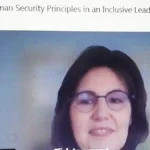The Human Security Institute
Minutes of 6th Lecture of Lecture Series on Exploring the dimensions of Human Security
Topic of the Lecture: The Evolution of Human Security in EU Policy Discourse
Guest Speaker: Dr. Muhammad Riaz Shad (Jean Monnet Chair)
Date: May 20, 2021
Time: 01:00 pm
Concept and Scope of Human Security:
There are two models of security prevalent in the world; traditional security and nontraditional security. The traditional model of security has the state at its center, and it was established after the treaty of Westphalia was signed between the European power at the time. The nation state emerged as a result. Concerned with the centrality of the state, this model of security revolves around a state’s ability to defend itself against external threats. Theoretically it is rooted in the relist theoretic approach
It was not until the end of the Cold war era when it was realized that a secure state does not mean secure citizens. With this realization, human security started to emerge as a new paradigm.
What is human security?
In simple words, it aims to ensure the security of human beings/people/individuals from non-traditional security threats—both violent and non-violent—such as chronic poverty, ethnic violence, human trafficking, climate change, health pandemics, international terrorism, economic and financial woes/declines.
Scope of Human Security:
Unlike old wars, wars of the new era involve state and non-state actors, significantly increasing the spectrum of violence, and they pose threats ranging from political violence, organized crime and human rights violations to massacres – genocides – and other mass atrocities directed at civilians.
UN Human Development Report of 1994 adopts a broader view of human security as it covers both dimensions of human security; freedom from fear and freedom from want. Theoretically, the concept of human security is rooted in liberalism, as it emphasizes that ultimate objective of a state is human welfare.
EU’s policy discourse on Human Security:
The 1994 human development report was a milestone when it comes to human security. The concept of human security is quite recent so the policy discourses on human security have not been much successful. Three actors have adopted HS as part of their international development policy—Japan, Canada and EU.
EU is known as Civilian Power and Normative Power. It is characterized as civilian power because it is an economic power rather than a military power. It is known as Normative Power because it is founded on certain norms enshrined in EU’s body of law.
Ian Manners has identified 5 central norms and 4 minor norms on which the EU is founded. Central norms include:
- Peace
- Liberty
- Democracy
- Rule Of Law
- Human Rights
Minor norms are:
- Social Solidarity
- Anti-Discrimination
- Sustainable Development
- Good Governance
Human Security Through EU’s policies:
EU’s norms supporting the human security can be reflected in the Eu’s policies, strategies and repots. EU’s policy discourse on human security can be evaluated in the following policies:
- Common Foreign and Security Policy (CFSP), 1992
- Common Security and Defense Policy (CSDP), 1999
- European Security Strategy (ESS), 2003
- Implementation report on ESS, 2008
Common Foreign and Security Policy: seeks to “preserve peace and strengthen international security; promote international cooperation.
Common Security and Defense Policy: itis a component of the CFSP. It advocates a comprehensive approach comprising political, economic and military instruments to achieve the following objectives:
- Peacekeeping
- Conflict Prevention
- Strengthening of International Security
The ESS framed out five key threats:
- Terrorism
- Proliferation of weapons of mass destruction (WMD)
- Regional conflicts
- State failure
- Organized crime European Security Strategy (ESS):
In 2008, EU published an Implementation Report on the European Security Strategy. For the first time, the report explicitly referred to human security as central to the EU’s strategic goals.
EU has been active in promoting the human security in the region and beyond through active policy making and collective efforts. EU has also developed a set of instruments for the promotion and implementation of human security. These instruments are as follows:
- Political Dialogue (instrument of persuasion)
- Development and Humanitarian Assistance (instrument of capacity building)
- Economic incentives (instrument of conditionality)
- Sanctions (instrument of coercion)
- Military and civilian missions and operations (instrument of intervention)
These instruments, along with their policy deigns have led EU in achieving milestones in meeting their human Security goals.
Brief Bio of the Speaker:
Dr. Muhammad Riaz Shad holds a PhD in International Relations and is currently working as Associate Professor at National University of Modern Languages (NUML), Islamabad. He is also Jean Monnet Chair in ‘The European Union as an Actor in South Asia’. He is also Editor of the Journal of Research in Social Sciences.



